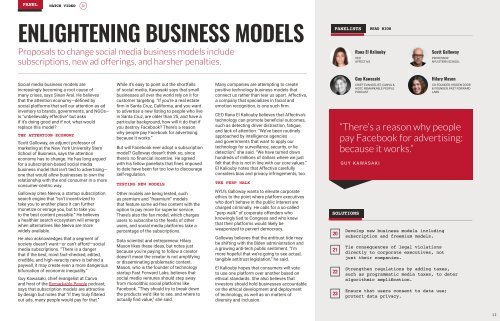You also want an ePaper? Increase the reach of your titles
YUMPU automatically turns print PDFs into web optimized ePapers that Google loves.
PANEL<br />
WATCH VIDEO<br />
ENLIGHTENING BUSINESS MODELS<br />
Proposals to change social media business models include<br />
subscriptions, new ad offerings, and harsher penalties.<br />
PANELISTS<br />
Rana El Kaliouby<br />
CEO<br />
AFFECTIVA<br />
READ BIOS<br />
Scott Galloway<br />
PROFESSOR<br />
NYU STERN SCHOOL<br />
Social media business models are<br />
increasingly becoming a root cause of<br />
many crises, says Sinan Aral. He believes<br />
that the attention economy—defined by<br />
social platforms that sell our attention as ad<br />
inventory to brands, governments, and NGOs—<br />
is “unbelievably effective” but asks<br />
if it’s doing good and if not, what would<br />
replace this model?<br />
THE ATTENTION ECONOMY<br />
Scott Galloway, an adjunct professor of<br />
marketing at the New York University Stern<br />
School of Business, says the attention<br />
economy has to change. He has long argued<br />
for a subscription-based social media<br />
business model that isn’t tied to advertising—<br />
one that would allow businesses to own the<br />
relationship with the end consumer in a more<br />
consumer-centric way.<br />
Galloway cites Neeva, a startup subscription<br />
search engine that “isn’t incentivized to<br />
take you to another place it can further<br />
monetize or enrage you, but to take you<br />
to the best content possible.” He believes<br />
a healthier search ecosystem will emerge<br />
when alternatives like Neeva are more<br />
widely available.<br />
He also acknowledges that a segment of<br />
society doesn’t want—or can’t afford—social<br />
media subscriptions. “<strong>The</strong>re is a danger<br />
that if the best, most fact-checked, edited,<br />
credible, and high-veracity news is behind a<br />
paywall, it may create even a more dangerous<br />
bifurcation of economic inequality.”<br />
Guy Kawasaki, chief evangelist at Canva<br />
and host of the Remarkable People podcast,<br />
says that subscription models are attractive<br />
by design but notes that “if they truly filtered<br />
out ads, many people would pay for that.”<br />
While it’s easy to point out the shortfalls<br />
of social media, Kawasaki says that small<br />
businesses all over the world rely on it for<br />
customer targeting. “If you’re a real estate<br />
firm in Santa Cruz, California, and you want<br />
to advertise a new listing to people who live<br />
in Santa Cruz, are older than 25, and have a<br />
particular background, how will it do that if<br />
you destroy Facebook? <strong>The</strong>re’s a reason<br />
why people pay Facebook for advertising:<br />
because it works.”<br />
But will Facebook ever adopt a subscription<br />
model? Galloway doesn’t think so, since<br />
there’s no financial incentive. He agreed<br />
with his fellow panelists that fines imposed<br />
to date have been far too low to discourage<br />
self-regulation.<br />
TESTING NEW MODELS<br />
Other models are being tested, such<br />
as premium and “freemium” models<br />
that feature some ad-free content with the<br />
option to pay more for superior service.<br />
<strong>The</strong>re’s also the fan model, which charges<br />
users to subscribe to the feeds of other<br />
users, and social media platforms take a<br />
percentage of the subscriptions.<br />
Data scientist and entrepreneur Hilary<br />
Mason likes these ideas, but notes just<br />
because you’re paying to follow a creator<br />
doesn’t mean the creator is not amplifying<br />
or disseminating problematic content.<br />
Mason, who is the founder of technology<br />
startup Fast Forward Labs, believes that<br />
social media ventures should step away<br />
from monolithic social platforms like<br />
Facebook. “<strong>The</strong>y should try to break down<br />
the products we’d like to see, and where to<br />
actually find value,” she said.<br />
Many companies are attempting to create<br />
positive technology business models that<br />
connect us rather than tear us apart. Affectiva,<br />
a company that specializes in facial and<br />
emotion recognition, is one such firm.<br />
CEO Rana El Kaliouby believes that Affectiva’s<br />
technology can promote beneficial outcomes,<br />
such as detecting driver distraction, fatigue,<br />
and lack of attention. “We’ve been routinely<br />
approached by intelligence agencies<br />
and governments that want to apply our<br />
technology for surveillance, security, or lie<br />
detection,” she said. “We have turned down<br />
hundreds of millions of dollars where we just<br />
felt that this is not in line with our core values.”<br />
El Kaliouby notes that Affectiva carefully<br />
considers bias and privacy infringements, too.<br />
THE PERP WALK<br />
NYU’s Galloway wants to elevate corporate<br />
ethics to the point where platform executives<br />
who don’t behave in the public interest are<br />
charged criminally. He calls for a so-called<br />
“perp walk” of corporate offenders who<br />
knowingly lied to Congress and who knew<br />
that their platforms would likely be<br />
weaponized to pervert democracy.<br />
Galloway believes that the antitrust tide may<br />
be shifting with the Biden administration and<br />
a growing anti-tech public sentiment. “I’m<br />
more hopeful that we’re going to see actual,<br />
tangible antitrust legislation,” he said.<br />
El Kaliouby hopes that consumers will vote<br />
to use one platform over another based on<br />
ethical standards. She also believes that<br />
investors should hold businesses accountable<br />
on the ethical development and deployment<br />
of technology, as well as on matters of<br />
diversity and inclusion.<br />
SOLUTIONS<br />
20<br />
21<br />
22<br />
23<br />
Guy Kawasaki<br />
CHIEF EVANGELIST, CANVA &<br />
HOST, REMARKABLE PEOPLE<br />
PODCAST<br />
Hilary Mason<br />
Develop new business models including<br />
subscription and freemium models.<br />
Tie consequences of legal violations<br />
directly to corporate executives, not<br />
just their companies.<br />
Ensure that users consent to data use;<br />
protect data privacy.<br />
CO-FOUNDER, HIDDEN DOOR<br />
& FOUNDER, FAST FORWARD<br />
LABS<br />
“<strong>The</strong>re’s a reason why people<br />
pay Facebook for advertising:<br />
because it works.”<br />
GUY KAWASAKI<br />
Strengthen regulations by adding taxes,<br />
such as programmatic media taxes, to deter<br />
algorithmic amplification.<br />
12
















